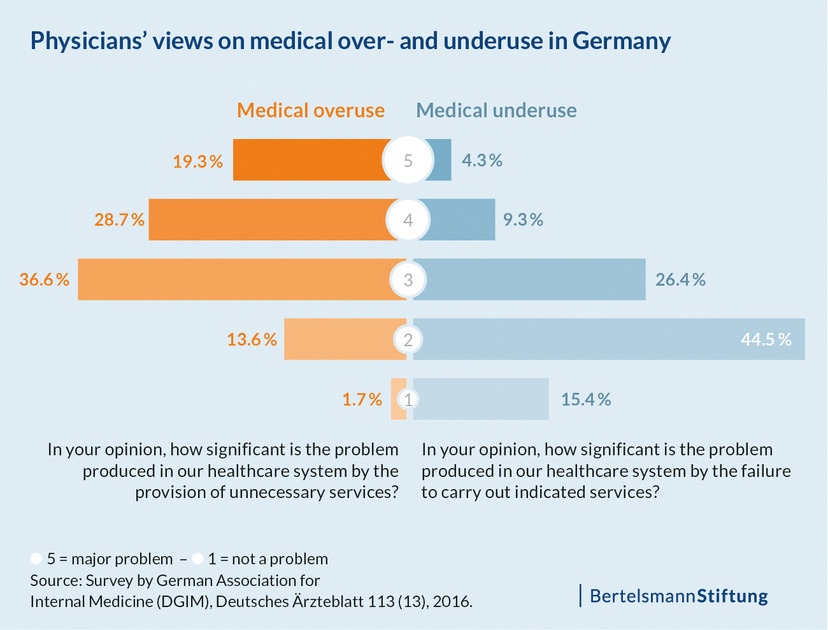On 4th of November we conducted a conference titled "Does Germany need more Choosing Wisely?" in Berlin. Our conference traced the steps leading to medical care overuse and introduced Choosing Wisely as a physician-led counter-movement. Leaders in the field from Canada, Newzealand, the Netherlands and Germany reported on their experiences and achievements with Choosing Wisely. By bringing together international experts with health policy and medical experts and decision-makers, we discussed ideas and practices from other countries that could be of interest for Germany as it aims to improve patient care.
![[Translate to English:] Arzt und Patient im Gespräch.](/fileadmin/files/_processed_/1/a/csm_1827930588iStock-529114512_MPL_293d7836c2.jpg)
iStockphoto/didesign021
International physicians’ initiative against medical overuse
Choosing Wisely is an initiative that wants to engage physicians and other clinicians in conversations with patients about the use of unnecessary tests and treatments. We are exploring the factors contributing to the initiative’s international success.
Choosing Wisely Conference
From quickly prescribed X-rays for back pain to overprescribing antibiotics – waste is a major problem in the German healthcare system. There are several drivers of overuse, which makes it that much more difficult to combat. In an effort to battle this trend, physicians in the United States have initiated the Choosing Wisely campaign, which has quickly gained traction internationally.
Choosing Wisely raises awareness about medical services that can do more harm than good. Launched in 2011, the campaign has since gone global. Taking a closer look at the campaign, the Bertelsmann Stiftung has explored the factors underlying Choosing Wisely’s success and its unique features. Outlining the features and outcomes of the campaign’s various initiatives in a Bertelsmann Stiftung-commissioned study, British healthcare expert Dr. Angela Coulter has drafted recommendations for the German context. In addition, we spoke with Prof. Dr. Wendy Levinson, Choosing Wisely Canadas’s Chair, about the campaign’s aims, hurdles and success factors.
As in any other country, it’s important for Germany to take a bottom-up approach, create a campaign, not a scientific endeavour and make it brief.
Prof. Dr. Wendy Levinson, Chair, Choosing Wisely Canada
Unnecessary tests, treatments and procedures in Germany
Physicians and patients alike see overuse as a problem in Germany. More than 50% of the public are of the opinion that medically unnecessary services are carried out not only occasionally, but often or even very often, in German medical practices. More than one-half of the 4,000 internists in Germany polled view overuse as a significant to major problem in the German healthcare system and view underuse as a minor or insignificant problem.
Top 5 lists of unnecessary services
Compiled by medical specialty societies in each country, so-called top 5 lists of services that physicians and patients should question are a core element of the Choosing Wisely campaign. Recommendations in the top 5 should be based on evidence, that is, there should be demonstrable proof that the service offers patients few advantages and might even do harm. Employing methods suitable to their national context, the specialty societies determine which five services are to be included in the top 5 list of their field. This means, for example, they can take different approaches to involving physicians in identifying and selecting the services to be included in each top 5 list. How each society goes about this is up to them. It is precisely this kind of bottom-up approach that serves to motivate physicians and helps make the campaign so successful in different countries. In just two years’ time, every medical specialty society in Canada has compiled a top 5 list that is met with support and advanced by patient organizations.
Choosing Wisely aims to change thinking: less is more
Another success factor is the campaign’s grassroots approach. Emphasizing the importance of patient-doctor dialogue, Levinson states: “As in any other country, it’s important for Germany to take a bottom-up approach, create a campaign, not a scientific endeavour and make it brief.” In order to reach genuinely shared decisions for better outcomes, she notes, physicians and patients need to engage in dialogue with each other. The goal here is to advance a shift in thinking that acknowledges the fact that sometimes less is more in medical services.
Our interview with Dr. Levinson about the campaign’s aims, hurdles and success factors as well as the findings for the “Choosing Wisely – Learning from International Experience” study by Angela Coulter are included in our SPOTLIGHT Healthcare. The full study is available free of charge as a download.
In addition, the “Choosing Wisely Starter Kit,“ which outlines the campaign’s principles, offers guidance on how to introduce the campaign, and provides useful contacts and references on the issue, is available also as a download below.




